Deqs 1.0.0 (2023-12-12)
In-browser tool for solving ordinary differential equations (ODE) systems is implemented. It takes formulas in a declarative form, and creates a UI that solves the equations, visualizes the results, and lets you change parameters on the fly.
- Go to Apps and run EquaSleek X
- Enter formulas or modify template
- Press Run button on the top panel
Apply built-in templates and use-cases. Right click to get them.
Dive into modeling complex processes & phenomena with this tool!
Check the simplicity!
1 Like
Diff Studio 1.0.2 (2023-12-12): docs
Diff Studio is a simple tool for in-browser modeling complex processes and phenomena given by ordinary differential equations (ODEs). It takes formulas in a declarative form, and creates a UI that solves the equations, visualizes the results, and lets you change parameters on the fly.
- Go to Apps and run Diff Studio
- Modify formulas and press Run button
- Press Open icon on the top panel and check Examples
- Press APP button and get platform application with user interface
- Press JS button and get JavaScript script for extensions creating
Check the simplicity of models design with Diff Studio!
1 Like
Chem 1.8.9 (2023-01-09): docs, release notes
Features:
- Update MinimalLib to 1.2.15 featuring support for RGroups (support for R-group decomposition)
- Chem: Add ability to specify fingerprint types and cluster embeddings for chemical space
Bug Fixes:
- GROK-14383: Chem | Scaffold Tree: The selection doesn’t change on folder node click
- GROK-14411: Demo: Exception while closing Scaffold Tree
- GROK-14409: Chem | R-Group Analysis: Error with prefix
- GROK-14375: Chem | Activity cliffs: Implement scatter plot lines renderer
-
#2612: Chem | Scaffold tree: Structure part containing H atom is replaced with ‘?’ in some cases
1 Like
Diff Studio 1.0.3 (2024-02-19) : docs
Dive into modeling with Diff Studio! It is a simple tool for simulating complex processes and phenomena given by ordinary differential equations (ODEs). Just input formulas and get results. Explore complex models right in your browser. Check new features of Diff Studio:
- Improved UI for interactive model exploration
- Updated correctness check
- Extended features of
#output- & #update-blocks
- Advanced visualization of multi-stages simulation
- Model ivp-files handling and preview
Go to Apps and run Diff Studio. Explore built-in tamplates and examples. Use them as a backbone of your projects.
2 Likes
Diff Studio 1.0.6 (2024-03-08): docs
This and two previous releases improve modeling with Datagrok:
- Sensitivity Analysis directly from Diff Studio
- Custom model formating feature
- The Bioreactor example
- Extended check of model correctness
- Improved UI styles & visualization options
Model with Diff Studio. Check the simplicity of complex processes simulation!
2 Likes
Curves 1.2.16 (2024-03-15): docs, release notes
Features:
-
#2105: Added outlier color property.
Bug Fixes:
- Renamed “Show curve confidence intervals” to “Confidence intervals”
-
#2101: Fixed statistics calculation
-
#2103: Made statistics columns adding functions DG functions
1 Like
Diff Studio 1.0.8 (2024-04-08): docs
This release improves usability of Diff Studio:
- Pharmacokinetics (PK) modeling is added to the examples set
- App view provides Diff Studio run right in the browse view
Check these updates!
2 Likes
EDA 1.1.19 (2024-04-15): docs
This release improves usability of Multivariate Analysis. Open a table and run from the top menu: ML | Analyze | Multivariate Analysis...
Check interactivity of data exploration!
2 Likes
Diff Studio 1.0.10 (2024-06-10): docs
This version provides
- two additional methods for numerical solving ODEs
- solver management
- max computation time control feature
1 Like
EDA 1.1.27 (2024-07-02)
This release complements Datagrok predictive modeling tools. High performance linear regression computation is added.
1 Like
SimPKPD 1.0.12 (2024-07-30)
This and the previous releases improve usability and fix issues.
Dive into pharmacokinetic-pharmacodynamic (PK-PD) modeling with Datagrok!
Check the main app: App > Model Catalog > PK-PD,
and demo: App > Demo > Compute > PK-PD modeling
1 Like
Bioreactor 1.1.9 (2024-07-30)
Fixed demo app issues.
Check the main app: App > Model Catalog > Bioreactor ,
and demo: App > Demo > Compute > Bioreactor
1 Like
EDA 1.1.30 (2024-07-30)
This release complements Datagrok predictive modeling tools with partial least squares (PLS) regression.
To apply PLS regression:
- Open dataframe
- Go to Top Menu > ML > Models > Train Model…
- Specify
Predict and Features
- Select
Eda: PLS Regression in the Model Engine field
- Set
Components
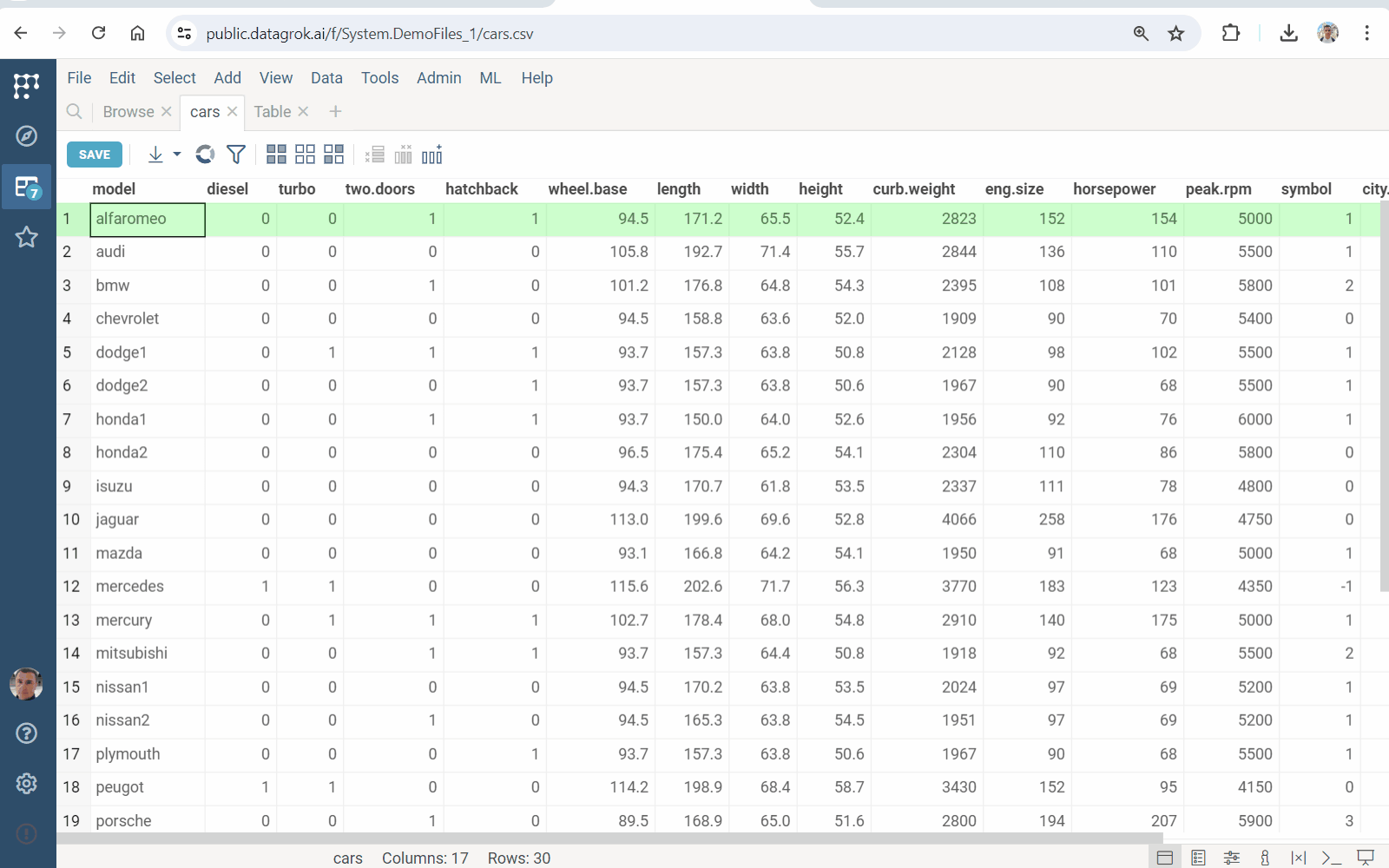
Check interactive machine learning!
1 Like
EDA package 1.1.30
This release also includes Datagrok dimensionality reduction toolkit, which supports combination of multiple columns of different types (molecules, Sequences, numbers…) with corresponding distance functions and light-speed performance with use of WebGPU.
You can read more about the dimensionality reduction capabilities of Datagrok here.
To run dimensionality reduction:
- Open dataframe
- Go to Top Menu > ML > Dimensionality Reduction…
- Specify
Columns
- For each column, specify
distance function and weight
- Choose desired method (UMAP or t-SNE) along with their hyper-parameters
- Choose desired post-processing (clustering of embeddings)
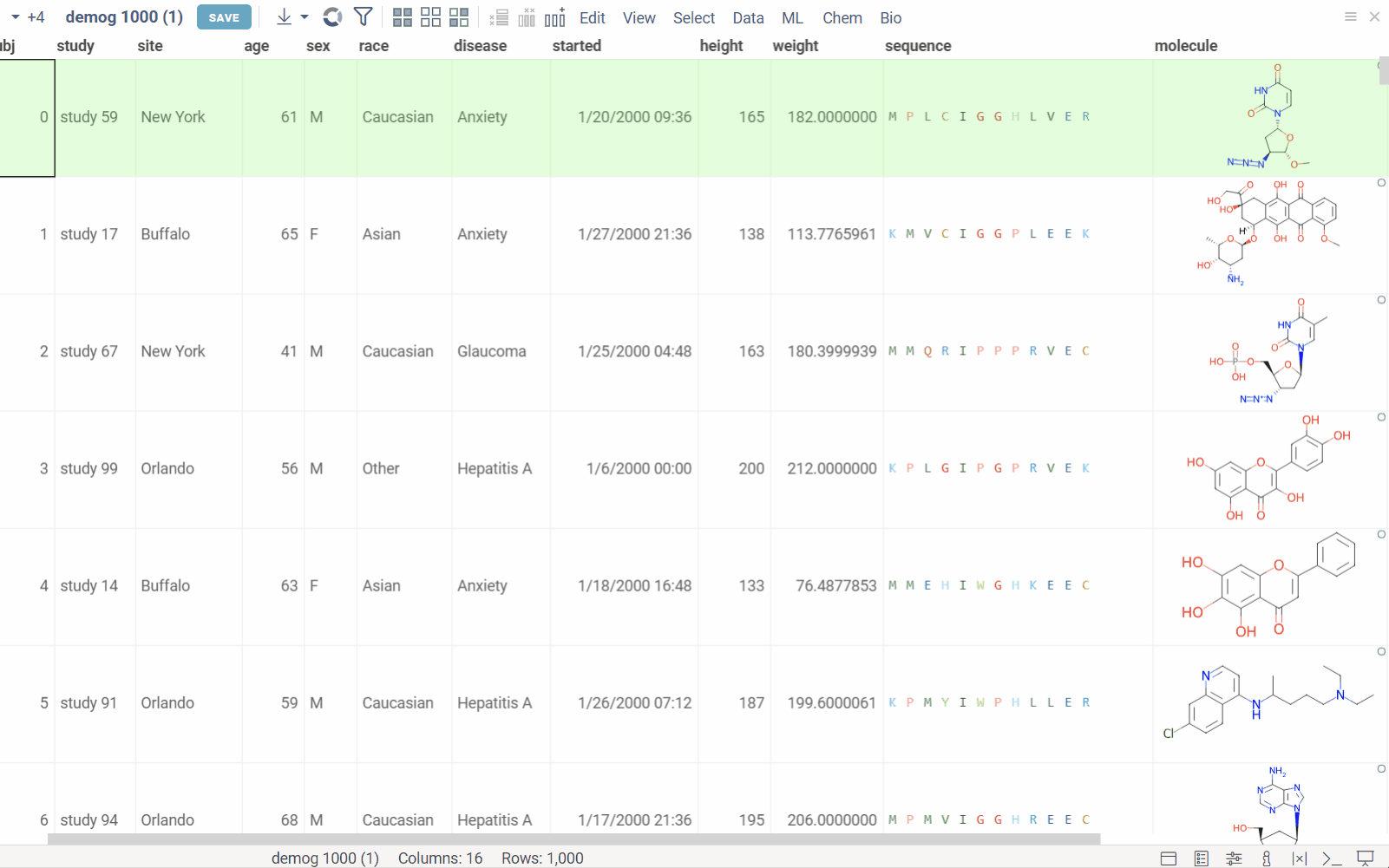
1 Like
Hit Triage 1.2.0 (2024-07-30)
This release includes permission management capabilities for Hit Design / Hit Triage campaigns and other improvements, like direct support of compute queries/scripts, duplicate molecule detection and improved campaign/template management.
You can read more about capabilities of Hit Triage / Hit Design applications here.
1 Like
Peptides 1.17.24 (2024-07-29)
This release includes several new features to the viewers included shipped from Peptides package:
- Logo Summary Table: Ability to aggregate string columns and display them as pie chart distribution
- Invariant Map / Mutation Cliffs: Ability to select value aggregation from any column, setting color column, aggregation, scale and schema, ability to specify target column and category.
- Most Potent Residues: Corrected way of detecting statistically most potent residue, with ability to specify activity target (high or low)
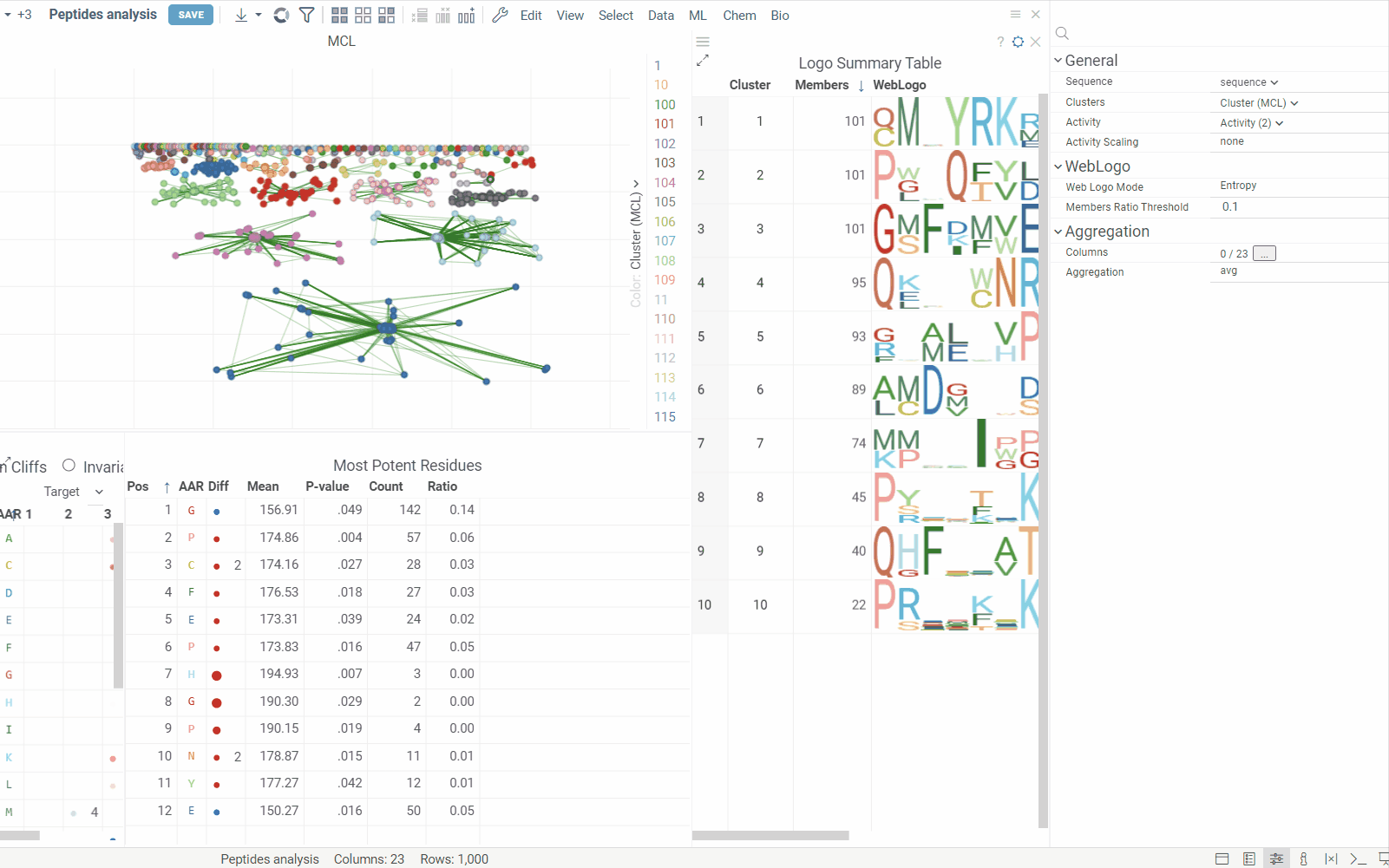
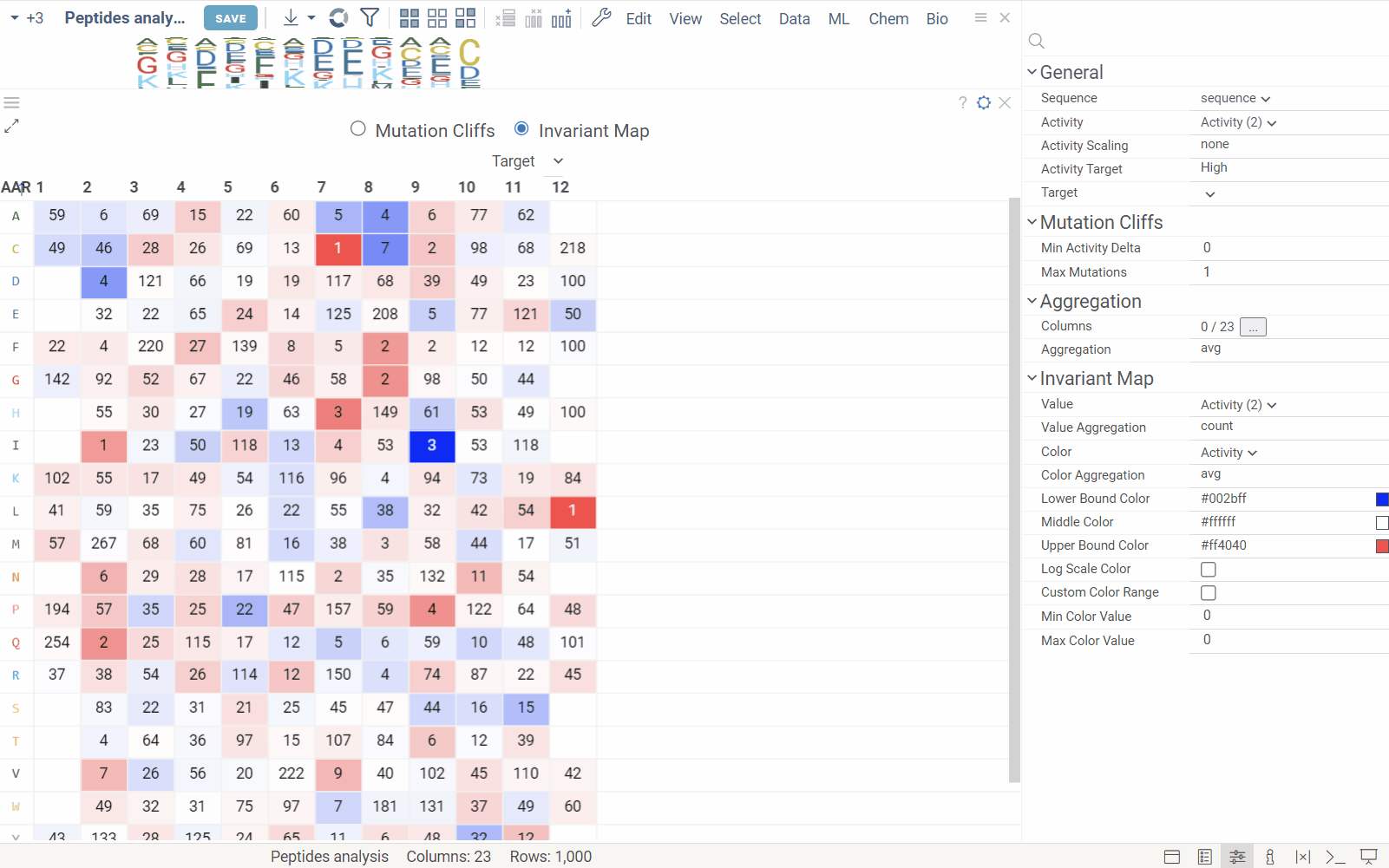
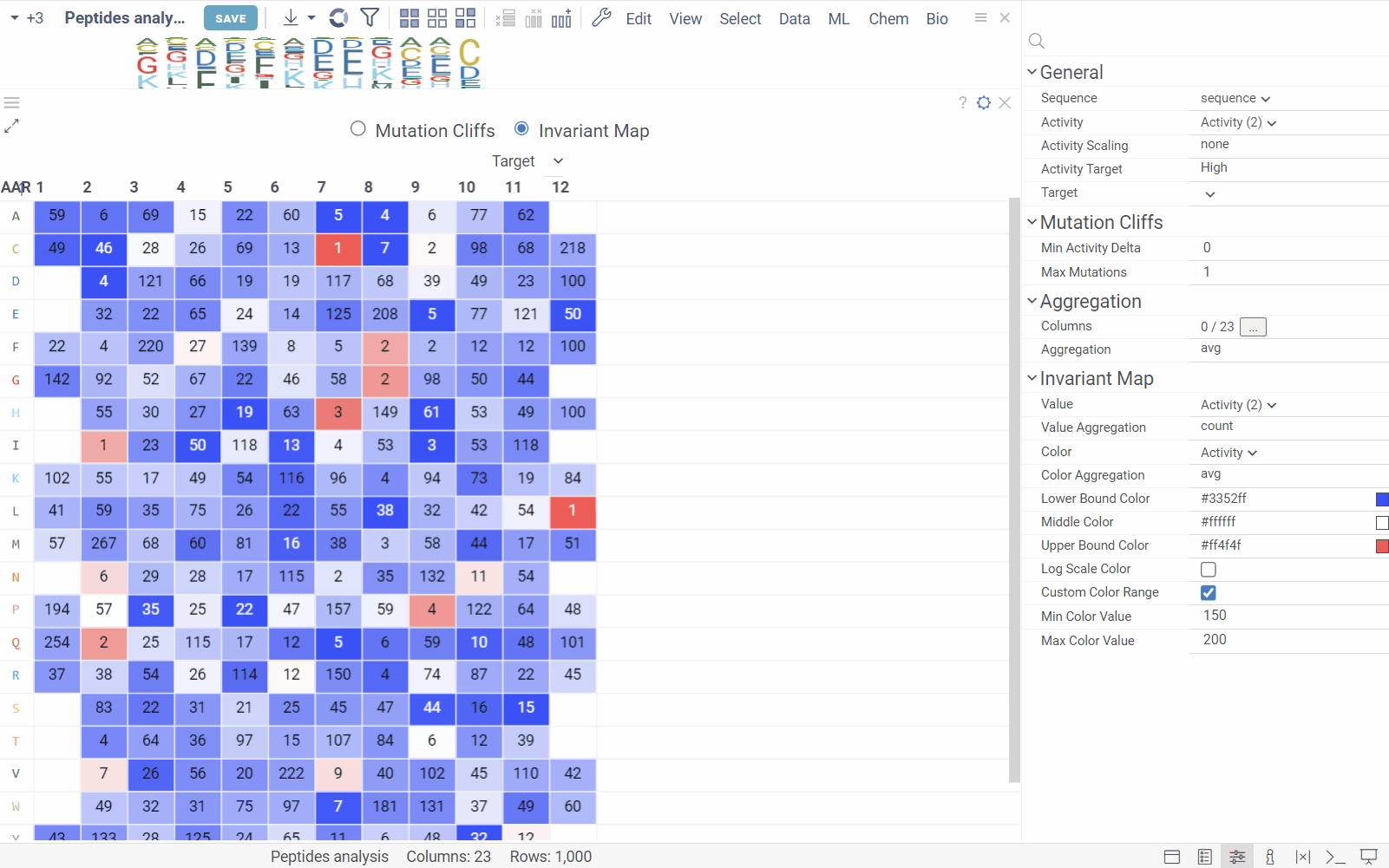
1 Like
Chem 1.9.0 (2024-03-21): docs, release notes
Features
-
#2495: Chem: MMP - initial vesrion
-
#2540: Chem | Substructure search: Add an option to toggle the realignment of molecules by molecular filter
-
#2525: Chem | Scaffold Tree: Remove the intermediate dialog before the color picker
-
#2504: Filter panel: The question mark hovering doesn’t show the filtering of the scaffold tree viewer
Bug Fixes
- GROK-15147: Chem | Scaffold Tree: Highlighting disappears in some cases
- GROK-15240: Chem | RGroups: Handling malformed data
- GROK-15213: Chem | RGroups: Undo latest analysis doesn’t work when run on multiple dataframes
- GROK-15187: Chem | RGroups: Fixed memory consumption
- GROK-15171: Chem: Substructure filter doesn’t apply correctly after removing rows and disable
1 Like
Chem 1.9.1 (2024-04-12): docs, release notes
Features
- R Group analysis: in browser R group analysis using RDKit JS, highlight of r groups, ability to define enumerated R groups in core
- Similarity/Diversity search: ability to recalculate results on filtering
1 Like
Chem 1.9.2 (2024-04-12): docs, release notes
Features
- R Group analysis improvements: ability to select ‘Only match at R groups’, saving R group user settings, small UI improvements
1 Like
Chem 1.10.0 (2024-06-12): docs, release notes
Features
- Webgpu acceleration for chem space, activity cliffs, molecule generations
- GROK-15299: Chem: Ability to save results of Chem functions to projects with and without data sync
- GROK-15454: Chem: Similarity/Diversity search viewers: Row source property
- GROK-15508: Chem: MMP: Generated - show what cases are actually generated
- GROK-15501: Chem: MMPA: UI/UX improvements
- GROK-15502: Chem: MMPA: Ability to swith activity on/off
- GROK-15507: Chem: MMP: Control of fragments size
- Chem: Integrate with Chemprop
- Chem: Chemprop upgrade from version “1.6.7” to version “2.0” (reduced memory usage, improved performance)
Bug Fixes
- GROK-15285: Chem: MMP: Error on re-run
- GROK-15321: Chem: MMP: Error while running Close All after running MMP
1 Like




